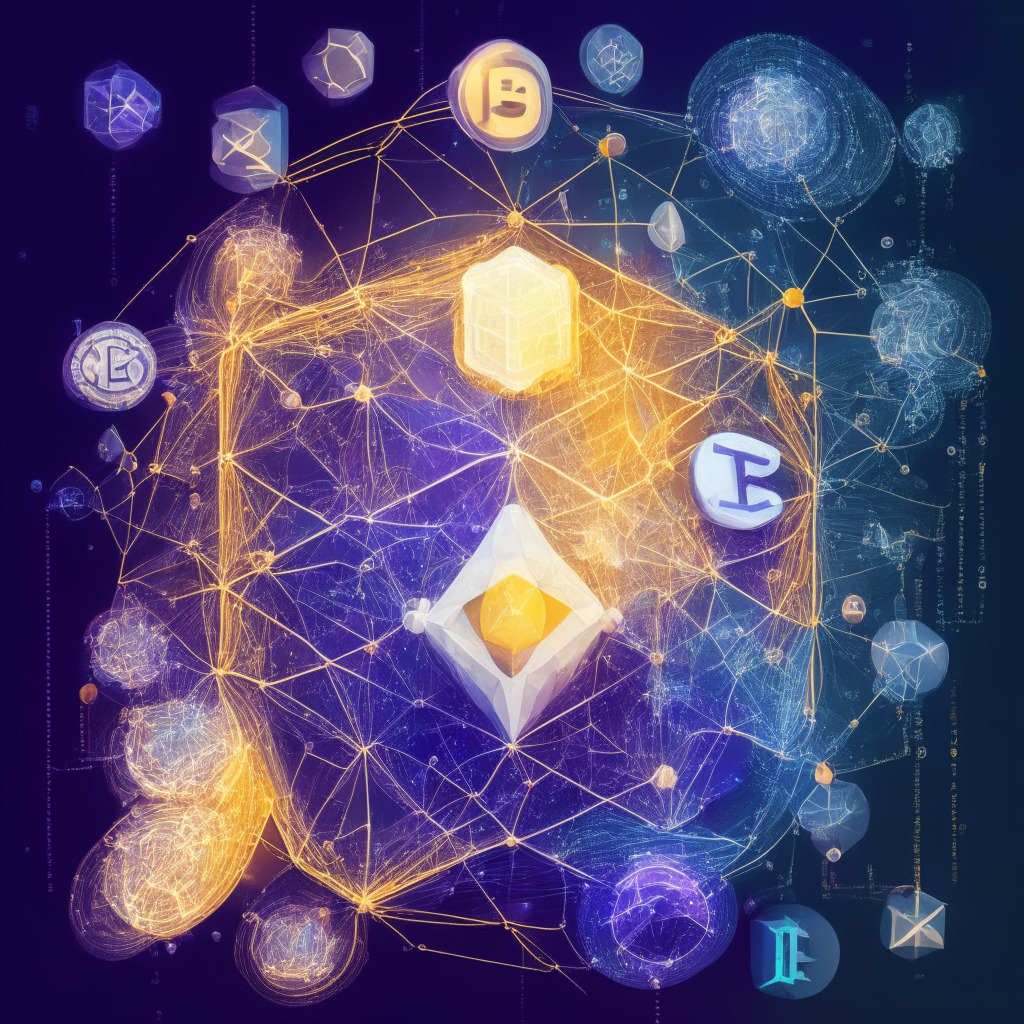The founder of Arbitrum, Ed Felten, introduces Stylus as a game-changer for Ethereum Virtual Machines (EVMs). Stylus allows developers to use languages like Rust, C, and C++, speeding up computations and reducing gas costs. This could lead to advancements in code development, higher performance on-chain operations, and potentially making EVMs safer.
Search Results for: Ethereum Virtual Machine
Ethereum’s Bumpy Journey: From Proof-of-Work to Proof-of-Stake and Beyond
A pivotal upgrade known as the Merge transitioned Ethereum from a proof-of-work (PoW) consensus mechanism to a proof-of-stake (PoS), causing a net supply decrease of 299,922.50 ether. The PoS mechanism needs users to hold ether to validate transactions and earn rewards. This eliminated much miner supply and made Ethereum more eco-friendly. However, despite these changes, ether’s market values have stagnated.
Exploring the Edge of Ethereum Scaling: The Promising Potential and Challenges of Proto-danksharding and Linea
“Proto-danksharding, or EIP-4844, is a proposed Ethereum security feature set to significantly reduce fees for rollups. By introducing data blocks that are temporally attached and later erased, transaction costs are minimally affected. Despite promising advancements, rollup costs are largely dictated by data availability, challenging the thorough implementation of this crucial scaling solution in the Ethereum ecosystem.”
Ethereum’s Co-founder Sells Remaining Stake in MakerDAO: A Signal for Blockchain’s Future?
Ethereum co-founder, Vitalik Buterin, recently traded his remaining stake in MakerDAO tokens after MakerDAO’s co-founder announced plans to reimplement the project on a new blockchain, NewChain. The move shows shifting alliances and notable developments in blockchain dynamics.
Bridging the Gap: BOB Solution Blends Bitcoin and Ethereum Amid Controversy
“Interlay recently unveiled its Minimum Viable Product (MVP), the Build on Bitcoin (BOB) solution, designed to link Ethereum blockchain advancements with Bitcoin’s user community. BOB will enable decentralized application development, leveraging Rust smart contracts compatible with Bitcoin legacy libraries, while also supporting Ethereum Virtual Machine. Despite concerns from some Bitcoin advocates, the Interlay team remains optimistic about broadening Bitcoin’s applicability.”
DeFi Drama: Curve Finance Exploit, Zunami Protocol Losses and the Rise of Ethereum’s Linea
“In response to a $62 million hack, Curve Finance is assessing each impacted user for potential reimbursement. In contrast, the DeFi protocol Zunami Protocol suffered a $2.1 million loss via an attack on its ‘zStables’ pools. On a positive note, ConsenSys launched its Ethereum scaling rollup Linea, bridging over $26 million in ETH.”
Scaling Ethereum’s Future: The Rise of Linea & the Road to Unlocked Potentials
“ConsenSys’ new layer-2 scaling solution, Linea, encourages developers to create or migrate decentralized applications for Ethereum. Powered by zero-knowledge proofs, Linea promises seamless Ethereum blockchain interaction, improved performance, better user experience, and lower transaction costs. Intertwined with MetaMask, it seeks to boost non-fungible tokens, blockchain games, and social media applications. Despite some initial access restrictions, Linea’s future looks promising.”
ConsenSys Launches Linea: The Future of Faster, Cheaper Ethereum Transactions
ConsenSys’ latest rollup network, Linea, aims to deploy a zero-knowledge (ZK) cryptography framework to the Ethereum network, offering cheaper and faster blockchain transactions. Linea, compatible with the Ethereum Virtual Machine, could transform the platform’s accessibility by reducing transaction costs. However, these newer ZK rollup networks, including Linea, still need to prove their presumed efficacy.
Kakarot Testnet: A Game Changer for Starknet and Ethereum EVM Compatibility?
Starknet’s upcoming Kakarot testnet, launching in August, aims to achieve Ethereum Virtual Machine (EVM) compatibility for the layer-2 scaling solution. Backed by prominent figures like Vitalik Buterin, this development seeks to remove hurdles for developers and improve rollup performance in the Ethereum ecosystem.
Ethereum Scaling Showdown: zkSync Era Surpasses $500M TVL – Winners, Losers, and Future Impacts
Matter Labs’ zkSync Era, a zero-knowledge rollup technology for scaling Ethereum, has seen its total value locked (TVL) surpass $500 million. This reflects a 12% growth in one week, indicating strong demand for advanced scaling solutions in the decentralized finance (DeFi) space.
Ethereum’s Future Hinges on Scaling, Wallet Security, and Privacy: The Critical Triad
Ethereum co-founder Vitalik Buterin emphasizes the need for three major technical transitions to ensure Ethereum’s success: layer-2 scaling, wallet security, and privacy-preserving features. These transitions aim to enhance user experience without sacrificing crucial components while promoting mass-market adoption and addressing technical and practical hurdles.
Grill.chat Integrates EVM Wallets: Connecting Ethereum Identities and Expanding Crypto Communities
Grill.chat, a Subsocial-based chat app, has integrated Ethereum Virtual Machine (EVM) wallet compatibility, enabling users to chat using their Ethereum identities and send crypto via Polygon. This development attracts new Web3 projects and allows access to over 70 crypto-related chat rooms. Subsocial is a Polkadot parachain designed for social media applications.
Anoma Foundation’s $25M Funding Boosts 3rd-Gen Blockchain: Will Intent-Centric Tech Outshine Ethereum?
Anoma Foundation secures $25 million to develop its third-generation blockchain architecture offering increased composability and ease of use. Focusing on intent-centric design, Anoma aims to further decentralize existing blockchain-based applications and platforms, enhancing decentralized applications (DApps) and services, such as decentralized exchanges and rollup protocols.
Ethereum Scaling Meets Telecom Giant: Exploring Polygon and Deutsche Telekom Partnership
Deutsche Telekom partners with Ethereum Layer-2 scaling platform Polygon, joining as one of the 100 validators on its Proof-of-Stake (PoS) network. The collaboration aims to improve the Ethereum ecosystem and strengthen Polygon’s protocol security, governance, and decentralization, attracting attention across multiple industries.
Visa Tackles Ethereum Account Abstraction & ERC-4337: Revolutionizing Crypto Payments
Visa explores Ethereum Account Abstraction and ERC-4337 for secure automatic recurring payments and potential gas fee redesigns. This aims to improve user convenience and enable seamless digital transactions in crypto onboarding experiences. Ethereum co-founder, Vitalik Buterin, supports these innovations for self-custodial wallets.
Optimism’s Bedrock Upgrade: Pros, Cons, and Impact on Ethereum Scaling Solutions
The upcoming Bedrock upgrade for Layer 2 scaling solution Optimism aims to improve transaction fees, network security, and Ethereum compatibility. Benefits include a 47% decrease in fees, shortened deposit times, and enhanced Ethereum Virtual Machine compatibility, positioning Optimism competitively in the Layer 2 space.
Mastering Ethereum Transactions: Maximizing Efficiency and Ensuring Success
Understanding the inner workings of Ethereum transactions is crucial for users to fully utilize its features. By using blockchain explorers to monitor transaction statuses, users can optimize network usage, ensure transaction success, and adjust spending habits for an improved Ethereum experience.
Zero-Knowledge Tech Fueled W-Pay: A Revolution in Secure Crypto Transactions
“Wirex, a global digital payment platform, introduces W-Pay, an App Chain powered by Zero-Knowledge technology. Aimed at enhancing connections between DApps, non-custodial wallets, and traditional payment systems, it offers swift, secure transactions and total fund control. The Ethereum Virtual Machine compatibility ensures diverse functionalities and promotes crypto ecosystem interoperability.”
SushiSwap Expands to Aptos: A Reworked View on Decentralized Exchange Landscape
“SushiSwap, a reputed decentralized digital asset exchange, has expanded its operations to Aptos, a layer 1 blockchain, marking its first integration outside Ethereum Virtual Machine (EVM) compatibility. The move aims to bolster SushiSwap’s multi-chain network strength while providing fresh capital to Aptos, helping it compete against other non-EVM blockchains.”
Crypto Error Sees Loss of $500k in BTC: A Week of Crypto Highs, Lows, and Ethical Pursuits
In a significant blockchain error, a Bitcoin user mistakenly paid a 20 BTC ($500,000) fee to move only 0.074 BTC ($200). Additionally, gaming VC firm Animoca Brands secured $20 million for the Mocaverse project, and Unstoppable Domains introduced a Business-to-User messaging feature. Meanwhile, the DOJ targets Bitcoin fraud and French regulators launch an educational module for influencers. Decentralized exchange Sushi integrated with non-Ethereum Virtual Machine chain Aptos, marking a significant step in blockchain interoperability.
Sushi’s Blockchain Leap: Breaking Boundaries or Overextending its Reach?
Decentralized exchange Sushi is extending its services to non-Ethereum Virtual Machine compatible blockchain, Aptos, marking a major development. This strategic move could potentially attract fresh capital towards Aptos while enhancing cross-chain trading experiences and opening up new possibilities for liquidity across major blockchain networks.
Arbitrum Stylus: Next-Gen Tool for Crypto Coding or Just Another Developer Gimmick?
Offchain Labs, creators of the Arbitrum blockchain, have developed a tool called Arbitrum Stylus to tap into the larger developer community. This tool facilitates easier working with popular languages like Rust, C++, and C without departing from the Ethereum Virtual Machine standard. It seeks to bring more developers towards the Ethereum ecosystem, leveraging languages more common than Solidity, the main Ethereum coding language. The ultimate deployment of Arbitrum Stylus rests with the Arbitrum DAO community.
Exploring Immutable’s zkEVM: A Game Changer for Web3 Gaming or a High Risk Load?
Immutable is testing its new blockchain technology layer, zkEVM, aiming to reduce reliance on singular network infrastructure. The zkEVM, designed to lower gas fees and boost transaction rates, seamlessly integrates with the Ethereum Virtual Machine, enabling easy transition of existing smart contracts. However, developer autonomy brings potential risks and challenges in infrastructure connectivity.
Forta Network Amplifies Scam Detection: A Leap Forward or a Perpetual Tightrope Walk?
“Forta Network has enhanced its scam detection services by expanding its threat focus and incorporating malicious URL data. The service employs real-time threat detection across seven Ethereum Virtual Machine chains, and uses predictive techniques and new smart contract scanners to identify potential crypto threats.”
Exploring the The Rise of Cardano Amid Key Network Upgrades and Market Flux
“Cardano network activity has surged, reflected by a rise in transactions and technical improvements. Despite a dip in active daily users, the ratio of transactions to active addresses is increasing, implying more active users. Key upgrades, including provision for Ethereum Virtual Machine smart contracts, could potentially boost token prices and expand the Cardano ecosystem’s utility.”
Polygon’s ZK Technology Upgrade: Boon or Bane for Blockchain’s Future?
Polygon aims to make its primary chain compatible with zero knowledge (ZK) technology, potentially transforming it into a zkEVM validium and ensuring Ethereum Virtual Machine compatibility. This upgrade could enhance security, eliminate reorgs, expedite transactions, and scale the blockchain more effectively. However, the complex integration may introduce unforeseen challenges.
Frax Finance Introduces Fraxchain: Layer-2 Future or Overhyped Complexity?
Frax Finance plans to introduce its own layer-2 blockchain, Fraxchain, by the end of 2023. This Ethereum Virtual Machine-compatible solution aims to enable faster transactions and decentralized sequencer capabilities using a hybrid rollup model. The innovative staking model and Frax’s success with frxETH could generate interest among crypto enthusiasts.
TASE’s Blockchain PoC Success: Tokenizing Bonds, Fiat & Future Impact on Financial Industry
The Tel Aviv Stock Exchange (TASE) completed the proof of concept phase of Project Eden, exploring blockchain technology for issuing and settling government bonds. The PoC featured tokenization of the Israeli Shekel and used Ethereum Virtual Machine-compatible blockchain, with support from major international and local banks.
Bitcoin Smart Contracts: Revolutionizing Crypto or Crippling the Network?
Cryptocurrency developer Punk3700 launched the claimed first Bitcoin-based smart contract, reigniting the debate between Bitcoin maximalists and those open to diverse blockchain technologies. Projects like metaverses and an Ethereum Virtual Machine for Bitcoin raise concerns about network congestion and higher transaction fees, potentially discouraging users in developing countries.
Wirex’s W-Pay: Future DeFi Gamechanger or Just Another Crypto Wild Card?
Wirex’s new service, W-Pay, introduces a non-custodial crypto debit card service leveraging Zero-Knowledge (ZK) proofs-based technology. This service offers a new way of interacting with cryptocurrencies daily, promising swift, secure transactions, and sole control over funds. However, ongoing challenges with partnership dependencies may pose questions about the technology’s reliability.
Multiswap Revolution: Avalanche’s Pioneering Leap Toward Multiple Token Swaps in a Single Transaction
In a significant advancement for blockchain technology, the CavalRe team has launched Multiswap on the Avalanche blockchain, enabling users to swap up to 300 different tokens in a single transaction. This function paves a new path for blockchain trading and empowers users to execute intricate trading strategies quickly and cost-effectively. However, the promising tool may present potential security risks.
Navigating the Future: Exploring Recent Advances and Challenges in Blockchain and Crypto Industry
“BNB Chain developers launched opBNB’s mainnet, aiming to address blockchain’s congestion and high transaction costs. Nansen presented an AI-powered upgrade of its platform to track suspicious trades and monitor transfers. Ripple plans to hire internationally due to regulatory dissatisfaction. Telegram and TON Foundation announced a self-custodial crypto wallet, TON Space, while Opera launched a non-custodial stablecoin wallet in Africa.”































